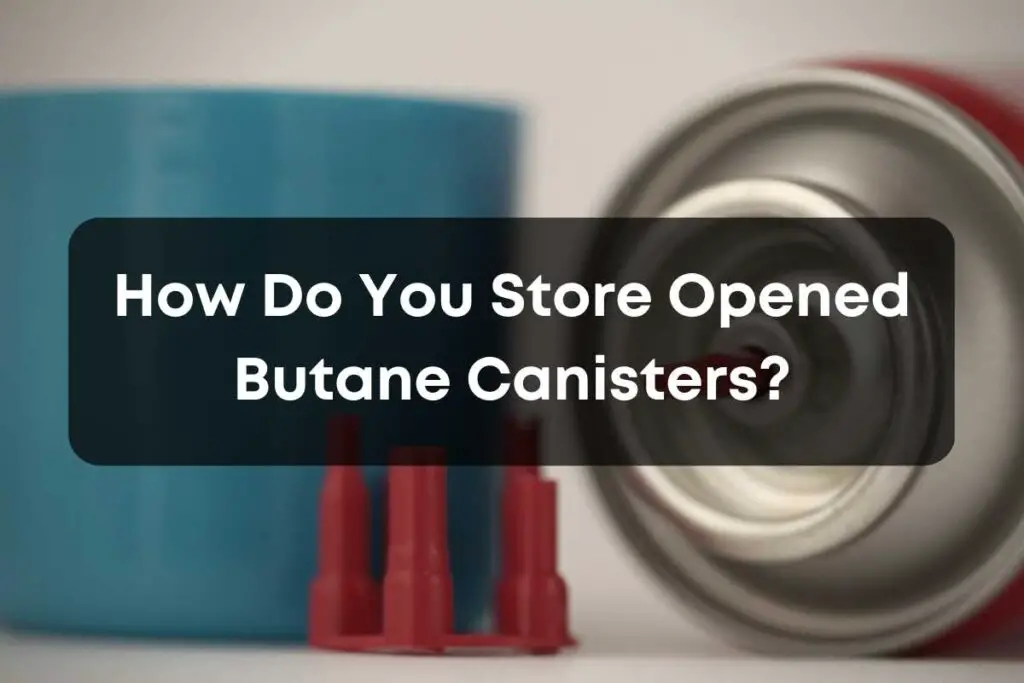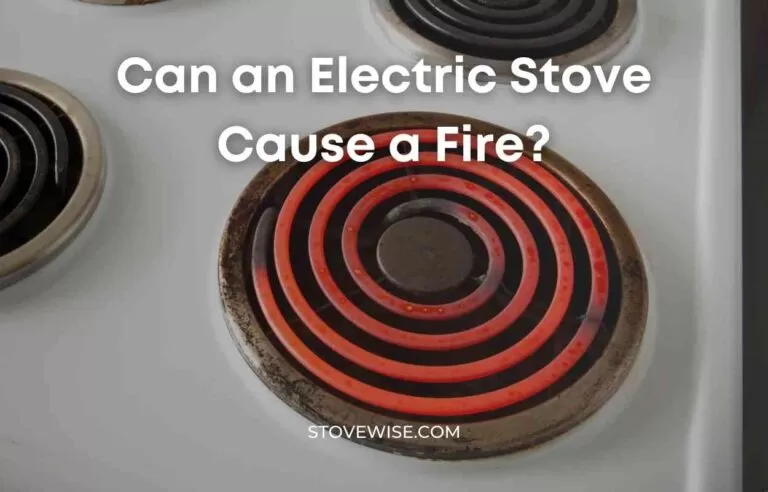How Do You Store Opened Butane Canisters?
Butane canisters are frequently used for camping, cooking, and heating. However, improper storage can result in hazards and a shorter lifespan.
How Do You Store Opened Butane Canisters?
To store opened butane canisters safely, you should keep them in a cool and dry place where the temperature doesn’t go above 122°F (50°C). It’s crucial to avoid exposing them to too much heat as this can lead to an explosion. Therefore, you should not store the canisters in low-lying areas like basements and instead keep them in a well-ventilated space.
Also, make sure to keep the canisters away from any heat sources, sparks, open flames, or hot surfaces. This post will go over the best ways to store opened butane canisters to maintain their safety and longevity.

Contents
- Should Butane Be Stored Upright?
- Can Butane Be Stored in the Refrigerator?
- Where to Store Butane Canisters at Home?
- Is It Safe to Store Butane on Its Side?
- Will Butane Explode If Dropped?
- Does Butane Explode in Heat?
- Why Fill Butane Upside Down?
- What Happens If Butane Gets Cold?
- Should You Shake Butane Before Filling?
- Should You Leave Butane Canister in Stove?
- Wrap Up.
Should Butane Be Stored Upright?
Butane should be kept upright. When a butane canister is stored upright, the liquid butane is on the bottom and the gas is on top.
This separation guarantees that when the butane is used, it flows smoothly and consistently. If the canister is kept on its side, liquid butane may leak out and provide a fire risk.
Storing the canister upright also prevents any liquid butane from entering the fuelled appliance and causing damage or malfunction.
Can Butane Be Stored in the Refrigerator?
Butane should never be kept in the refrigerator. Butane canisters should be kept in a cool, dry, well-ventilated location away from direct sunlight, heat, and flames.
Refrigerators are meant to keep a cool temperature and a high humidity level, which can cause condensation to collect on the canister’s surface.
This moisture can corrode and weaken the metal, resulting in leaks or other risks. Furthermore, storing butane canisters in the refrigerator can cause the pressure inside the canister to rise, leading to leaks or ruptures.
As a result, butane canisters should be stored in a cold, dry, and well-ventilated place, away from any sources of heat or moisture.
Where to Store Butane Canisters at Home?
Butane canisters should be kept cool, dry, and well-ventilated, away from direct sunlight, heat, and flames. To avoid inadvertent punctures or leaks, keep them in a designated container, such as a metal cabinet or a plastic bin.
Any sources of ignition, such as electrical appliances, open flames, and smoking materials, should also be kept away from the storage area.
Furthermore, keep butane canisters out of reach of children and pets, as the contents of the canisters can be harmful if ingested or inhaled.
You may assist maintain the safety of your butane canisters by following these rules.
Is It Safe to Store Butane on Its Side?
Butane canisters should not be stored on their sides. When a butane canister is kept on its side, liquid butane can enter the valve and potentially block it, causing the canister to leak or fail to function properly.
Moreover, storing butane canisters on their side increases the risk of accidental punctures or leaks, which can lead to a fire.
As a result, butane canisters should be stored upright, in a cool, dry, and well-ventilated environment, away from direct sunlight, heat, and flames.
Will Butane Explode If Dropped?
If a butane canister is dropped or suffers a significant impact, it may explode. Butane is a highly flammable gas that is held in a canister under high pressure.
If the canister is dropped or pierced, the gas’s quick release might pose a fire hazard and an explosion. As a result, butane canisters must be handled with caution, avoiding any hard handling or impacts.
If you suspect that a butane canister has been damaged, it should not be used and should instead be disposed of safely in accordance with local regulations.
Does Butane Explode in Heat?
Butane has the potential to explode when exposed to extreme temperatures or an open flame. When butane is stored in a canister, it is stored as a liquid under high pressure.
When the canister is opened, however, the butane rapidly expands and turns into a gas. Butane gas can ignite and create an explosion if exposed to high temperatures or an open flame.
If you heat the canister to the point where the pressure inside the canister exceeds its maximum limit, it will rupture and explode. As a result, butane canisters should be stored in a cool, dry, well-ventilated environment away from heat and fires.
It is also critical to follow the manufacturer’s instructions while using butane and to avoid using it near any sources of heat or ignite, such as stovetops or open flames.
Why Fill Butane Upside Down?
The technique of filling butane upside down is used to fill lighters and other devices that require a precise amount of butane gas.
Filling the device upside down allows the liquid butane to flow more readily into the device, and any air pockets in the butane canister are less likely to interfere with the flow of gas.
Moreover, filling the device upside down prevents any impurities or sediment from accumulating at the bottom of the butane canister from entering the device and potentially causing blockages or malfunctions.
It is crucial to note that not all devices must be filled upside down, and it is critical to follow the manufacturer’s filling and use instructions to guarantee safe and proper performance.
Also, make sure to check our detailed guide on using LGP in a butane stoves.
What Happens If Butane Gets Cold?
When butane becomes cold, it can cause a number of problems with the gas’s pressure and performance. Butane is stored as a liquid under high pressure in canisters.
When the valve is opened, the liquid butane escapes and rapidly expands to become a gas. When the temperature drops, the pressure inside the canister drops, as does the rate of expansion of the butane gas.
This can impair the performance of equipment that rely on a precise flow of butane gas, such as lighters or torches, which may not function correctly in cooler temperatures.
Furthermore, if the temperature falls below the butane’s freezing point (-1°C or 30°F), the butane may freeze and form ice crystals, which can clog the valve or cause other problems with the canister.
Butane canisters should be stored in a cool, dry, and well-ventilated environment, away from sources of heat and cold, and according to the manufacturer’s instructions for use and storage.
Should You Shake Butane Before Filling?
Shaking a can of butane before filling a device, such as a lighter or torch, is not always essential. Butane is held in canisters as a liquid under high pressure, and when the valve is opened, the liquid and gas components of the canister will naturally mix.
Shaking the canister may have no influence on the quality or performance of the butane gas, but it may introduce air bubbles or pollutants into the gas, affecting the device’s function.
However, if the butane canister has been stored for an extended period of time, or if it has been transported or jostled, allowing the canister to settle for a few minutes before use may be beneficial to allow any sediment or impurities to settle to the bottom of the canister.
To guarantee safe and proper operation, it is critical to follow the manufacturer’s recommendations for filling and using the device.
Should You Leave Butane Canister in Stove?
It’s not a good idea to leave a butane canister in a stove for longer than you need it. After using it, you should remove the gas canister from the stove and store it in a cool area that’s far away from any fire.
Even if you’ve already opened the canister, it will still be flammable and perfectly fine to use in your camping stove.
However, over time, the quality of the gas may start to deteriorate. So, it’s best not to leave it sitting unused for too long.
Wrap Up.
Finally, correctly storing opened butane canisters is critical for guaranteeing their safety and optimal performance.
Butane should be stored in a cool, dry, well-ventilated place, away from heat and cold sources, and always upright. Storing butane canisters in the refrigerator or on their side increases the danger of leaks and degrades performance.
It is also critical to observe the manufacturer’s recommendations for use and storage and to never drop or puncture a butane canister, as this can pose a safety risk.






